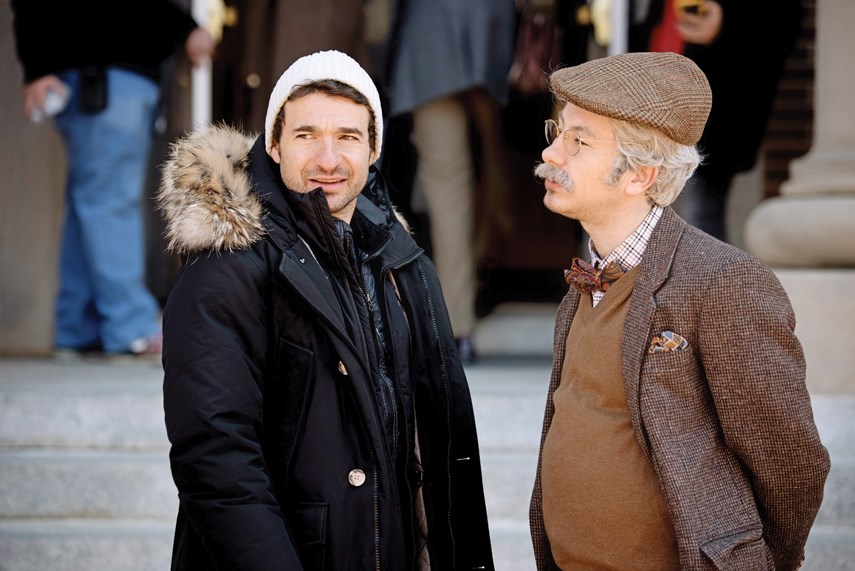Bart Layton is moving from room to room while on the telephone from London. He’s been away in Australia, you see, and so a dog and three kids – most noticeably a very chatty four-year-old – are clamouring for his attention in the background.
But it’s a welcome break from the zoo of international press that the director has been doing since the premiere of his new film, American Animals, at Sundance in January. The film was a crowd-pleaser at the festival and is something of a game changer in the “based on a true story” universe. “We’ve seen it so many times now, and you have that sneaky feeling that the ‘inspired by’ caption card is wildly fictionalized,” Layton says.
His first movie was the documentary film The Imposter, the gripping story about French trickster Frederic Bourdin, who claimed to be the missing son of a Texan couple whose child disappeared at age 13. Layton borrows from that structure in American Animals, telling the true story of four Kentucky college students who attempted the theft of rare books from their college library: interspersed with the planning and bungled execution of the heist are the real players themselves, now 12 years older and (spoiler alert) presumably wiser for having spent time behind bars. It lends the film a verisimilitude not found in other narratives.
Barry Keoghan plays Spencer, the art student who first lays eyes on the rare first edition of Audubon’s Birds of America, on display in the library. He mentions it in passing to his friend Warren (Evan Peters), a risk-taker who spearheads the idea of boosting the books, bringing in Chas (Blake Jenner) and Eric (former Vancouver Film Critics Circle winner Jared Abrahamson) to pull off the heist. Nope, that’s not how it happened, the real Spencer will interject, then real Warren will add his two cents’ worth. On occasion the real men will be transported into the re-creation, like people trying to remember the story in real time.
Balancing the documentary and the drama was never a challenge, Layton insists. “The final movie is, dare I say, almost surprisingly close to the script I wrote, and it worked better than I had initially anticipated. (The Imposter) was a documentary with dramatic elements, and this was the inversion of that: it wasn’t ever the intention that the documentary elements would be the main driving force of the narrative, it was envisaged that the drama and the actors would be doing that.
“I wanted to provide this counterpoint which would constantly remind you that it was a true story. The intention that your emotional investment in the characters and the movie will be heightened by the fact that it is all true.”
The boys prep for their criminal act by watching a bunch of heist movies while stoned. Thanks to Spencer’s artistry, a detailed model of the library is constructed. They adopt code names – “Mr. Pink” and “Mr. Blue” – like they did in Reservoir Dogs. (“I was Mr. Yellow because I was my mom’s sunshine,” the real Warren says with a straight face.)
The biggest mystery of the film is the Why of it all: the four young men came from relatively privileged backgrounds and had supportive parents. One clue comes from Spencer, who talks about not having suffered for his art in the way that van Gogh (who lost his ear) and Beethoven (who went deaf) did. Layton read the story about the Transylvania University theft years ago, was fascinated, and started a correspondence with the men while they were still in prison. “There was a lot of honesty in what Spencer said about feeling that in order to make art you have to have had an experience of life. I don’t know if I necessarily related to that but I certainly sympathized with the fact that he wasn’t going to be challenged,” Layton says. “All artists wonder if they’ve got anything of value to say.”
Success has shifted, Layton points out: the American dream used to be a college education, a nice car in the driveway and 2.4 kids. “For these kids, there’s something about that that’s not a success, it’s mediocrity in their eyes… If they don’t have a Wiki page by the time they’re 40, will that mean they’re not successful? That’s the metric for how interesting we are,” he says. I ask how he intends to shield his own children from social media as the new meritocracy. “It’s hard,” he admits. “We didn’t really have a TV when I was growing up, and I ended up running a TV show and making movies, so clearly if you try to hold the floodgates back they’ll yearn for it even more.”
Does he get the sense that Spencer, Warren, Eric or Chas have found themselves, albeit not in the way they intended to? “That’s one of the questions I’m hoping the audience will ask themselves,” says Layton. “Did they get what they were looking for, or are they back where they started?” It’s a question echoed in the cyclic quality to the movie: we end up in the same tranquil neighbourhood where it all began.
Where are the special lives that we’ve been promised? That’s what kept Layton devoted to the project. “Yes, it’s a great caper, it’s comedic and tragic, but mostly what I thought was exciting was how we in America and the U.K. struggle in a culture where being average is no longer acceptable. That’s what was really interesting to me to talk about,” he says, before adding, “And then of course deliver it in a cracking suspenseful heist movie.”



